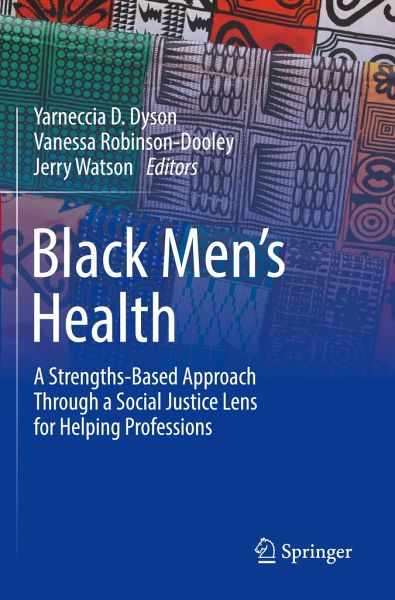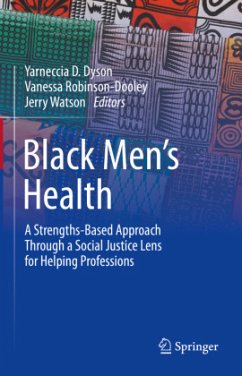
Black Men's Health
A Strengths-Based Approach Through a Social Justice Lens for Helping Professions
Herausgegeben: Dyson, Yarneccia D.; Robinson-Dooley, Vanessa; Watson, Jerry
Versandkostenfrei!
Versandfertig in 6-10 Tagen
46,99 €
inkl. MwSt.

PAYBACK Punkte
23 °P sammeln!
Now more than ever there is a need to focus on Black men's health in higher education and ensure that future practitioners are trained to ethically and culturally serve this historically oppressed community. This textbook provides practical insight and knowledge that prepare students to work with Black men and their families from a strengths-based and social justice lens. There is a dearth in the literature that discusses the prioritization of Black men's health within the context of how they are viewed by societal approaches to engage them in research, and health programming aimed at increasi...
Now more than ever there is a need to focus on Black men's health in higher education and ensure that future practitioners are trained to ethically and culturally serve this historically oppressed community. This textbook provides practical insight and knowledge that prepare students to work with Black men and their families from a strengths-based and social justice lens.
There is a dearth in the literature that discusses the prioritization of Black men's health within the context of how they are viewed by societal approaches to engage them in research, and health programming aimed at increasing their participation in health services to decrease their morbidity and mortality rates. Much of the extant literature is over 10 years old and doesn't account for social determinants of health, perceptions of health status, as well as social justice implications that can affect the health outcomes of this historically oppressed population including structuraland systemic racism as well as police brutality and gun violence.
The book's 13 chapters represent a diversity of thought and perspectives of experts reflective of various disciplines and are organized in four sections:Part I - Racial Disparities and Black MenPart II - Black Masculinity Part III - Black Men in Research Part IV - Social Justice Implications for Black Men's Health Black Men's Health serves as a core text across multiple disciplines and can be utilized in undergraduate- and graduate-level curriculums. It equips students and educators in social work, nursing, public health, and other helping professions with the knowledge and insight that can be helpful in their future experiences of working with Black men or men from other marginalized racial/ethnic groups and their families/social support systems. Scholars, practitioners, and academics in these disciplines, as well as community-based organizations who provide services to Black men and their families, state agencies, and evaluation firms with shared interests also would find this a useful resource.
There is a dearth in the literature that discusses the prioritization of Black men's health within the context of how they are viewed by societal approaches to engage them in research, and health programming aimed at increasing their participation in health services to decrease their morbidity and mortality rates. Much of the extant literature is over 10 years old and doesn't account for social determinants of health, perceptions of health status, as well as social justice implications that can affect the health outcomes of this historically oppressed population including structuraland systemic racism as well as police brutality and gun violence.
The book's 13 chapters represent a diversity of thought and perspectives of experts reflective of various disciplines and are organized in four sections:Part I - Racial Disparities and Black MenPart II - Black Masculinity Part III - Black Men in Research Part IV - Social Justice Implications for Black Men's Health Black Men's Health serves as a core text across multiple disciplines and can be utilized in undergraduate- and graduate-level curriculums. It equips students and educators in social work, nursing, public health, and other helping professions with the knowledge and insight that can be helpful in their future experiences of working with Black men or men from other marginalized racial/ethnic groups and their families/social support systems. Scholars, practitioners, and academics in these disciplines, as well as community-based organizations who provide services to Black men and their families, state agencies, and evaluation firms with shared interests also would find this a useful resource.












